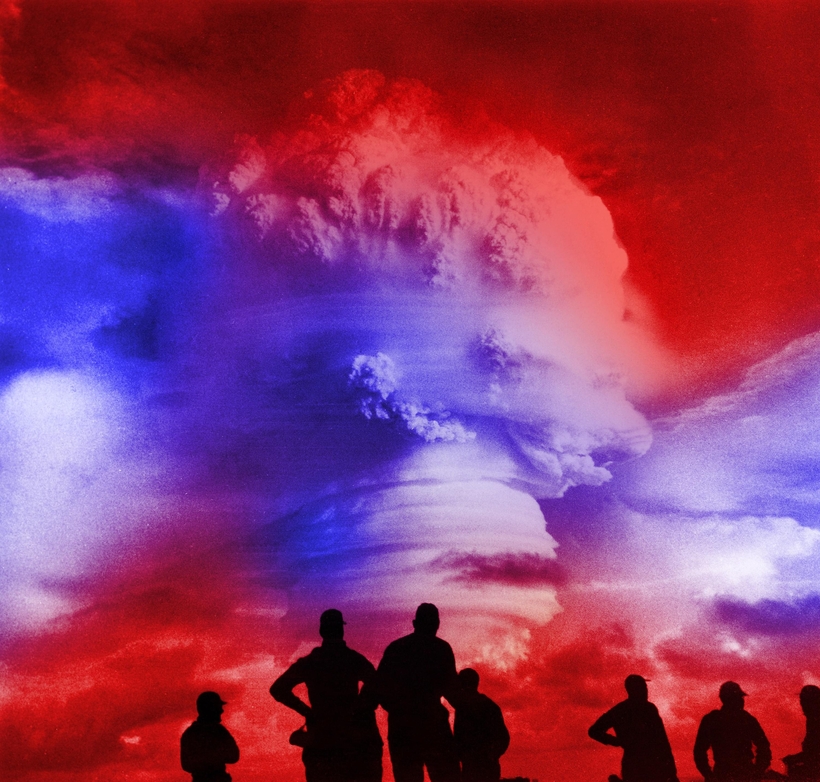Welcome to the great state of Pennsylvania! The Liberty Bell! Gettysburg! The Rocky statue! Your mind turning into mush every four years!
As anyone with a brain cell must know, Pennsylvania is a swing state in the presidential election that takes place Tuesday—the swing state among seven swing states. (Am I the only one who keeps thinking of the seven dwarfs?) And because the race between Donald Trump and Kamala Harris has been so close for months, there has been a campaign ad every six seconds on television.
The ads have been like a plague of rats, multiplying mercilessly, including during the World Series, won by the Los Angeles Dodgers Wednesday night. The games were mostly spectacular: not even the visage of Trump during breaks ruined the experience, except for making me a little sick.
It was fine at first—the stakes in this election are enormously high and the polls neck and neck. But like many doomed to live in Pennsylvania during the election cycle, I have grown to resent these ads. They are dull and repetitive. They are also counterproductive, tuning out potential voters instead of tuning them in. Earlier in the year, 70 percent of residents said they were experiencing campaign fatigue. It must be close to 100 percent now. The only thing more annoying is another ad featuring Peyton Manning.
Why can’t they leave us in peace? What have we done to deserve this? We are tired of being a swing state. Why can’t we be Washington or Oregon or Kansas or North Dakota, where the candidates don’t give a crap because the results are a foregone conclusion?
Let’s face it: Anybody who votes for a candidate on the basis of a 30- or 60-second television ad is someone of unusual vacuity. So are those who claim to still be undecided. How can anyone be undecided at this point? I don’t think anyone is undecided. They simply welcome the attention, hoping for an insipid little profile in the media. It makes them feel important and wanted, until the Tuesday election, when they turn back into pumpkins.
Based on research from past elections, many undecideds end up not voting. Or are fake undecided, too ashamed to admit they are casting their ballot for Trump. The candidates, instead of trying to sell themselves, should be sending out an entirely different message: Stop playing Hamlet and just vote.
Fat chance …
Trump and Harris have spent more than $530 million in Pennsylvania in advertising dollars, virtually all of it targeted on a minuscule portion of the electorate. The number of undecideds in Pennsylvania is believed to be somewhere around 3 percent, or 220,000. Which comes out to roughly $2,500 per potential voter.
They would be better off bribing them, like Elon Musk has tried to do.
Why can’t they leave us in peace? What have we done to deserve this? We are tired of being a swing state.
If watching television has become miserable, so has receiving text messages and e-mails (exacerbated in my case because, although I am a Democrat, I have somehow ended up on Republican mailing lists).
A smattering of texts from last Monday:
- 9:05 a.m.: an appeal from Stop Republicans PAC
- 10:15 A.M.: an appeal from Trump’s Save America
- 10:25 A.M.: an appeal from Pennsylvania Chase to boost mail-in voting by Republicans
- 3:45 p.m.: an appeal from Kansas City Chiefs kicker Harrison Butker and his Upright PAC to “mobilize Christians across America”
- 3:45 P.M.: an appeal from Progressive Takeover
- 3:45 p.m.: an appeal from the No Dem Left Behind PAC
- 3:45 P.M.: an appeal from Stop Trump PAC
- 3:45 P.M.: an appeal from the Progressive Turnout PAC on behalf of Harris
- 3:46 P.M.: a second appeal from Stop Republicans PAC
- 3:56 P.M.: a second appeal from Progressive Takeover
- 4:53 P.M.: an appeal from Democratic challenger Colin Allred to beat incumbent Texas senator Ted Cruz
- 5:01 P.M.: an appeal from Progressive Takeover on behalf of Harris
- 5:23 P.M.: a second appeal from Trump’s Save America
- 5:41 P.M.: a joint appeal from Democrats James Carville, Martin Sheen, Chuck Schumer, and the D.S.C.C.
- 7:38 P.M.: an appeal from the 2024 Victory Committee, in which, for the low, low price of $20.24, you can show you stand with both Trump and Elon Musk
- 7:48 P.M.: an appeal from the House Freedom Fund on behalf of Trump
- 8:36 P.M.: an appeal from Florida senator Marco Rubio with the promise of a 9,000 percent match
It comes to 17 appeals in less than 12 hours, and it doesn’t include e-mails, which tallied 45 before I lost count. A minimum of 62 appeals for money in one day. It is even more than the ones I get for penis enlargements.

Political ads did not become part of the election landscape until 1952, during the campaign of Republican Dwight D. Eisenhower for president, to try to shore up his miserable public-speaking style. Among the ads that year was an animated one made by Roy Disney. It was hard to measure the effectiveness of the ad. But it sure was cute, all those little figures marching along with their “I Like Ike” signs.
In my lifetime, of 70 years, I remember only two political presidential ads out of the thousands that have been made. The first was the so-called daisy-girl ad, from Lyndon Johnson in 1964, in which a little girl, innocently plucking daises, is followed by a cut to the mushroom cloud of a nuclear explosion. The implication was obvious: Johnson’s Republican opponent, Barry Goldwater, was a warmongering maniac. The ad ran only once. Goldwater’s name was never mentioned. But the impact was indelible, even for a 10-year-old kid living in a world of nuclear hysteria, in which we had bomb-shelter drills.
The other was the so-called Willie Horton ad, in 1988, from the presidential campaign of George H. W. Bush when he ran against Democratic challenger Michael Dukakis: the mug shot of Horton, a convicted murderer who had escaped from prison while on furlough and committed a series of crimes, including rape, was shown. The use of the mug shot was purposeful. It made Horton look like a savage and played into the fears of whites over Black men. Horton was from Massachusetts, and the clear implication was that Dukakis, the governor of the state and a proponent of the prisoner-furlough program, was responsible. The ad was virulently racist—Horton’s first name, William, was changed to “Willie” to make him as sinister as possible—but it still became a legend.
Other than these two, it’s in one ear and out the other, until you go to the doctor and beg for a lobotomy. It’s ironic that the World Series has simultaneously been played during the final week of the campaign. Just like the two warring political parties, you have two teams with a long history of heated competition, back to the days when the Dodgers were the Brooklyn Bums. But unlike a presidential campaign, the World Series is finite, a best of seven. One team loses and one team wins and then everyone goes home. Over and done.
This Tuesday’s election may be the end of the cycle, but the election will not be over. If Trump loses, he will undoubtedly refuse to accept the results and will run to the courts, hoping the case goes all the way up to the Supreme Court, where he has five justices in his pocket. If Harris loses by a razor-thin margin, she will run to the courts as well. There will be no congratulatory handshake, no finite ending, but more of the hatred and divisiveness and nastiness that has torn the country in two. Our long national nightmare will never be over.
It is a depressing thought. A horrible one, really. But there is a sliver of good news come Election Day.
No more campaign ads.
Buzz Bissinger is the author of Friday Night Lights and a co-author of Shooting Stars with LeBron James


